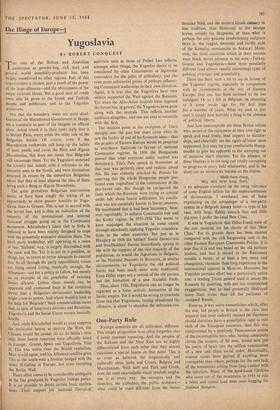The Hinge of Europe-3
Yugoslavia
By ROBERT CONQUEST TRE role of the Balkan and Anatolian peninsulas as powder-keg, sick man and general world instability-producer has been largely transferred to other regions. Part of this improvement is chance, part a result of the power of the large alliances—and the obviousness of the major external threat. But a good deal of credit must also be given to the Greek and Turkish people and politicians, and to the Yugoslav politicians.
Not that the boundary issues are quite dead. Guests of the Macedonian Government in Skopje see a mountain as part of the insignia on official plate, Asked which it is, their hosts reply that it is Mount Pirin, many miles the other side of the Bulgarian border. Of course, even if the Macedonian authorities still keep up the habits of their youth, and covet the Pirin and /Egean Macedonias, this does not mean that Belgrade will encourage them. Yet the Yugoslays annoyed the Greeks last month with a reference to the minority area to the South, and were themselves annoyed in return by the immediate Bulgarian retort that they at least abjured the idea of there being such a thing as iEgean Macedonia.
The quite gratuitous Bulgarian intervention seems to have been simply the taking of an opportunity to show greater hostility to Yugo- slavia than to Greece. This is not in accord with the Soviet line, and is thus an indication of the intensity of the international and internal factional struggle going on in the Communist movement. Khrushchev's latest visit to Sofia is believed to have been mainly designed to cope with the potentially explosive situation there. The local party leadership, still operating in a more or less `Stalinist' way, is largely discredited with the rank and file. Yet it is not in a position, as things are, to revert to terror adequate to control this. So all through the party oppositionist voices are being raised (citing, ironically enough, the Albanians—not for a policy to follow, but merely as an example of the possibility of resisting Soviet diktats). Unless these. moods can be appeased and contained there is the continual threat that a Bulgarian deviationist leadership might come to power. And where would it look to for help but Belgrade? Such considerations mean that, in spite of temporary detentes and flirtations, Yugoslavia and the Soviet Union remain basically hostile.
And, while Khrushchev would as soon suppress the revisionist heresy as destroy the West, the Chinese would far sooner do so. In Stalin's time only three fascist countries were officially listed in Europe: Greece, Spain and Yugoslavia. That is, Tito was worse than the British capitalists. Mao would agree, and his Albanian satellite gives Tito to the south-west a frontier hedged with the worst ill-feeling in Europe, not, even excepting, the Berlin Wall.
There often seems to be considerable ambiguity in the line produced by Yugoslav foreign policy. It is yet possible to detect certain basic motiva- tions. Their support for `national liberation', activities such as those of Pathet Lao reflects, amongst other things, the Yugoslav desire to be considered by other Communists as legitimate contenders for the palm of orthodoxy, and the even more substantial prizes of perhaps influenc- ing Communist leaderships in their own direction. Again, it is true that the Yugoslays have very seldom supported the West against the Russians. Yet when the Afro-Asian neutrals have opposed the Soviet line, in general the Yugoslays have gone along with the neutrals. This reflects another ambition altogether, and one not easy to reconcile with the first.
The decisive point in the evolution of Tito's thought over the past few years came when he saw the futility of one of hislavourite ideas—that the peoples of Eastern Europe would be prepared to overthrow Stalinism in favour of national Communist regimes. In 1956 the Hungarians proved that what everyone really wanted was democracy. Tito's Pula speech in November of that year was perfectly clear and realistic about this. He was violently attacked by Pravda for asserting that the whole Hungarian people pre- ferred even 'capitalism' to the continuance of the pro-Soviet rule. But though he recognised the facts which the Russians were trying to conceal under talk about fascist infiltrators, his conclu- sion was not essentially hostile to Soviet interests. He maintained that it had been 'necessary,' how- ever regrettably, to enforce Communist rule and the Kadar regime. In 1953-1956 Tito seems to have misjudged the situation to some extent through mistakenly applying Yugoslav considera- tions to the other countries. But just as in Hungary in 1956 the 'extinct' Social Democratic and Smallholders' Parties immediately sprang to life with the support of the vast majority of the population, so would the Agrarians in Bulgaria, or the National Peasants in Rumania, in similar circumstances. In Yugoslavia the old political forms had been much more truly eradicated. Even Djilas urges not a revival of the old parties, but the formation of a new Socialist Party.
Thus, since 1956, Yugoslavia can no longer be regarded as a force actively destructive of the Soviet empire. Yet it would be wrong to conclude from this that Yugoslavia, having abandoned the offensive, is about to abandon the defensive too.


































 Previous page
Previous page